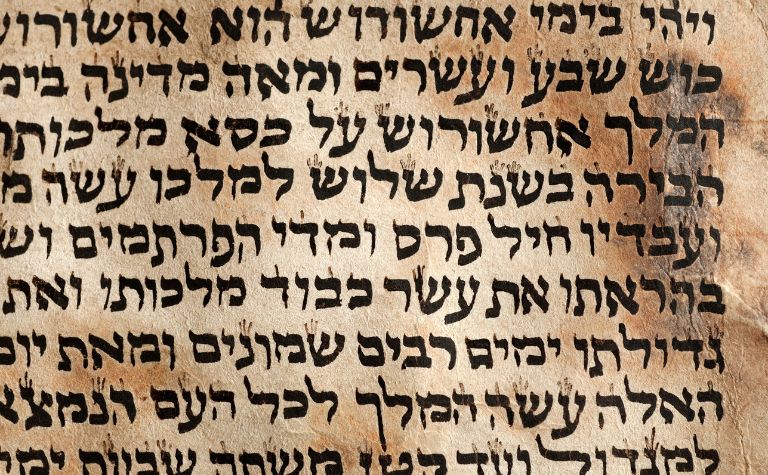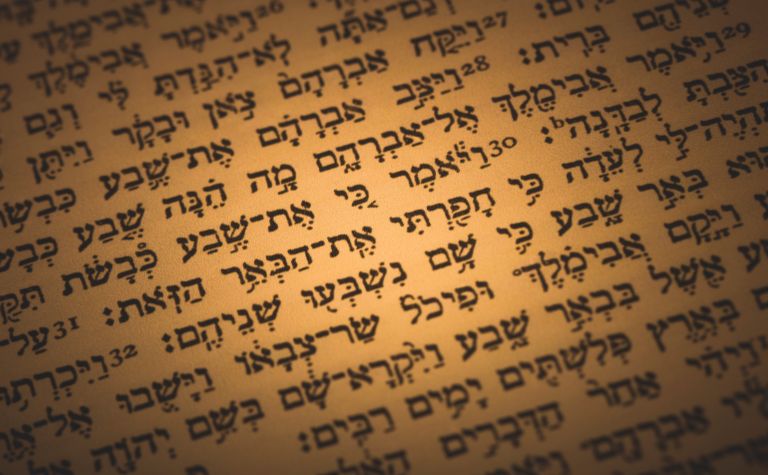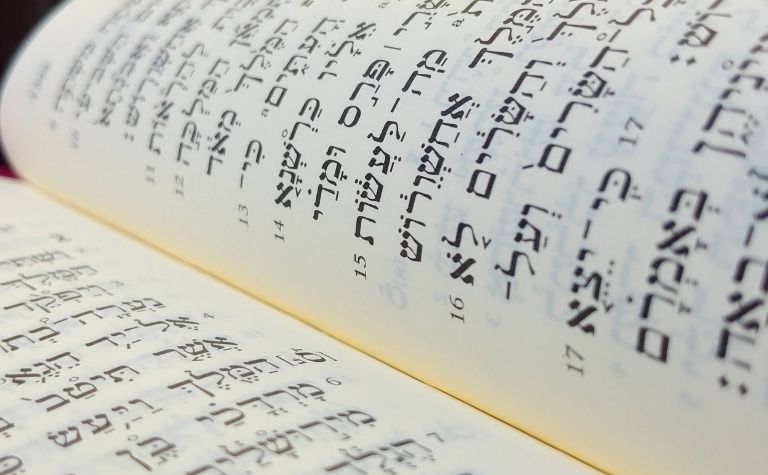The Old Testament comprises the first 39 books of the Christian Bible. Its main subject is how God worked in and through the nation of Israel to execute his plan to redeem people and save them from sin. There are four sections in the Old Testament: the books of law, history, poetry, and prophets. Many people are curious about the Old Testament’s original language.
The Old Testament was written in Hebrew. Some call it Biblical or Classical Hebrew. It’s a Semitic language whose alphabet consists of 22 consonants. Hebrew reads from right to left. There are also two passages in Ezra, one in Daniel, one verse in Jeremiah, and a few phrases and words in Aramaic.
What does Hebrew look like? How does the Old Testament describe the language of its authors? How old is Hebrew? Where does the New Testament refer to it? Why are there passages in Aramaic in the Old Testament? What did Jesus Christ say in Aramaic, according to Mark? Keep reading to learn the answers to these questions and others.
Also, see What Language Was the New Testament Written In? to learn more.

How the Old Testament Describes the Hebrew Language
The Old Testament doesn’t refer to the language of its authors as “Hebrew.” That was a name people started to call it during the 400 years between the Old and New Testaments. However, the Old Testament mentions its language multiple times using other descriptions.
The language of Canaan
For example, Isaiah 19:18 refers to it as the language of the Canaanites. “In that day there will be five cities in the land of Egypt that speak the language of Canaan and swear allegiance to the Lord of hosts. One of these will be called the City of Destruction” (ESV, emphasis added).
Canaan was one name for the land where the Hebrew people, later called Israelites and Jews, lived before and after their enslavement in Egypt. As a geographical description, Canaan describes the land between the Mediterranean Sea and the Jordan River that God promised Abraham and his descendants (Gen. 12:1-3).
In some Bible translations that aim to interpret the meaning of phrases instead of precisely translating them, the phrase refers to Hebrew. For example, “In that day five of Egypt’s cities will follow the Lord of Heaven’s Armies. They will even begin to speak Hebrew, the language of Canaan. One of these cities will be Heliopolis, the City of the Sun” (NLT, emphasis added).
The language of Judah
Another way the Old Testament refers to Hebrew is as the language of Judah. For example, Nehemiah 13:24 reads, “And half of their children spoke the language of Ashdod, and they could not speak the language of Judah, but only the language of each people” (ESV, emphasis added).
The name Judah means “praise Yahweh,” and the word “Jews” means “men of Judah.” The King James translation of the verse uses this term. “And their children spake half in the speech of Ashdod, and could not speak in the Jews’ language, but according to the language of each people.” (KJV, emphasis added)
Though the NLT says “language of Judah” in this verse, the CSB includes the word “Hebrew” in its translation. “Half of their children spoke the language of Ashdod or the language of one of the other peoples but could not speak Hebrew” (emphasis added).
Isaiah 36:11 also refers to the language of Judah. “Then Eliakim, Shebna, and Joah said to the Rabshakeh, “Please speak to your servants in Aramaic, for we understand it. Do not speak to us in the language of Judah within the hearing of the people who are on the wall.” (ESV)
The NLT reads, “Don’t speak in Hebrew, for the people on the wall will hear.” The NKJV reads, “Do not speak to us in Hebrew in the hearing of the people who are on the wall.” The CSB reads, “Don’t speak to us in Hebrew within earshot of the people who are on the wall.”
An example of Hebrew from Genesis 1:1
| English | Hebrew |
|---|---|
| In the beginning | בְּרֵאשִׁ֖ית |
| God | אֱלֹהִ֑ים |
| created | בָּרָ֣א |
| the heavens | הַשָּׁמַ֖יִם אֵ֥ת |
| and | וְאֵ֥ת |
| the earth | הָאָֽרֶץ׃ |
Also, see Who Wrote the New Testament? to learn more.

The Origin of Hebrew
The New International Bible Dictionary explains, “The historical origins of the language are somewhat obscure but go back beyond 2000 B.C.” [1] The name “Hebrew” originally described the descendants of Abraham, and later in history, people used it to describe the language they spoke.
Hebrew is part of the Semitic language family, along with Arabic, Akkadian, and Aramaic. In addition, it has similarities with Ugaritic, Phoenician, Moabite, and Canaanite languages.
Later in the Old Testament, the term “Israelites,” originating from God’s renaming of Jacob (Gen. 35:10), was a common way to describe the same people group. At times, the names “Hebrew” and “Israelites” seem interchangeable (e.g., 1 Sam. 14:21).
Hebrew in the New Testament
New Testament, including Jesus Christ, quotes or alludes to the Old Testament hundreds of times. However, the Hebrew language is only referred to twice, both times in the book of Revelation.
The first reference occurs in the context of the fifth trumpet. Revelation 9:11 reads, “They have as king over them the angel of the bottomless pit. His name in Hebrew is Abaddon, and in Greek he is called Apollyon.” (ESV) All major English translations read “Hebrew,” from the Greek word Hebraisti (Ἑβραϊστί).
The second time it occurs is in the context of the first bowl of wrath. Revelation 16:16 reads, “And they assembled them at the place that in Hebrew is called Armageddon.” (ESV) Similarly, all major English translations read “Hebrew,” from the same Greek word used in Rev. 9:11.
Some translations mention Hebrew in other verses, yet scholars disagree about whether it refers to Hebrew or Aramaic. For example, in the NKJV, John 5:2 reads, “Now there is in Jerusalem by the Sheep Gate a pool, which is called in Hebrew, Bethesda, having five porches” (emphasis added).
The same verse in the NIV reads, “Now there is in Jerusalem near the Sheep Gate a pool, which in Aramaic is called Bethesda and which is surrounded by five covered colonnades” (emphasis added). Likewise, the ESV reads, “Now there is in Jerusalem by the Sheep Gate a pool, in Aramaic called Bethesda, which has five roofed colonnades.”
Readers can find similar translation disagreements in John 19:13, 17, 20, and 20:16. The Greek word translated as “Hebrew” or “Aramaic” in these verses is the same found in Revelation 9:11 and 16:16.
Also, see Are There 46 Books in the Old Testament? to learn more.

Aramaic in the Old Testament
Aramaic is similar to Hebrew. Bible readers find both languages present among Abraham’s descendants.
For example, Genesis 31:47 reads, “Laban called it Jegar-sahadutha, but Jacob called it Galeed.” (ESV) The NLT gives more explanation, “To commemorate the event, Laban called the place Jegar-sahadutha (which means “witness pile” in Aramaic), and Jacob called it Galeed (which means “witness pile” in Hebrew).”
Ezra 4:8-6:18 and 7:12-26 are in the Aramaic language. Daniel 2:4-7 and verse 28 are in it, too. Jeremiah 10:11 is also in Aramaic. Why did writers change languages in the middle of a book?
Ezra scholar Mervin Breneman explains: “No doubt the author’s documents, the letters and replies, were written in Aramaic. Since the Jews became bilingual (Hebrew and Aramaic) during the exile, to avoid changing back and forth between languages he also put his comments in Aramaic.” [2]
Aramaic words and phrases in the New Testament
Jesus spoke the words below in Aramaic. Most historians believe it was one of three languages he spoke, along with Hebrew and Greek. Many scholars believe Mark wrote the words below in Aramaic because that is the language in which Jesus spoke them.
| Reference | Verse |
|---|---|
| Mark 5:41 | Taking her by the hand he said to her, “Talitha cumi,” which means, “Little girl, I say to you, arise.” |
| Mark 14:36 | And he said, “Abba, Father, all things are possible for you. Remove this cup from me. Yet not what I will, but what you will.” |
| Mark 15:34 | And at the ninth hour Jesus cried with a loud voice, “Eloi, Eloi, lema sabachthani?” which means, “My God, my God, why have you forsaken me?” |
Also, see How Many Chapters Are in the Old Testament? to learn more.
References:
[1] The New International Bible Dictionary. p. 427.
[2] Ezra, Nehemiah, and Esther. NAC. by Mervin Breneman. p. 102.
Related Questions
The New Testament is the most significant collection of writings in world history. Each gospel, letter, historical account, and sermon describe the life and ministry of Jesus of Nazareth and the...
Regular Bible reading is a valuable habit, as Scripture is God's message to people. However, the Bible's 66 distinct books, featuring various authors, settings, and themes, can make it challenging...
